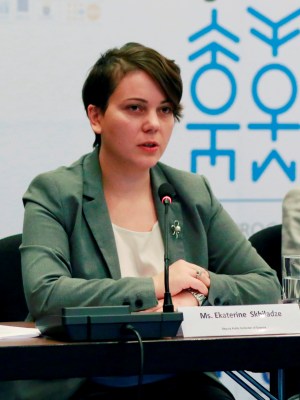Sexual Harassment – Georgia’s Public Defender’s Office Takes a Stand
Date:
The Public Defender of Georgia, in his “Special Report on Women’s Rights and Gender Equality” (2015), identifies sexual harassment in the workplace as one of the most widespread and unreported issues.

Ekaterine Skhiladze, Deputy Public Defender; Photo: UN Women/Maka Gogaladze
What legislative and protection mechanisms are there in Georgia for victims of sexual harassment, and how can these be strengthened?
Currently, the Public Defender’s Office considers sexual harassment as a form of discrimination. Our recommendation, however, has been to clearly define sexual harassment in the Labour Code, as the current legislative framework has its shortcomings.
Improving and implementing the legislation is critical for responding to the problem, but it may also have a preventive effect. By clearly regulating sexual harassment in the legislation, the state shows that it recognizes the existence and inadmissibility of sexual harassment. In addition to legislation, preventing sexual harassment in workplaces and creating internal response mechanisms in organizations are crucial.
Why is it important to create internal complaints mechanisms and what role can they play in sexual harassment prevention?
The practice of countries that have been successful in preventing sexual harassment shows that introduction of such mechanisms by employers is far more effective and less costly than legal action. All private and public employers should clarify that they do not tolerate sexual harassment; not only because it constitutes discrimination but also because it reduces productivity and is demoralizing for staff. An environment that is free from sexual harassment, on the other hand, shows that the employer cares about its staff, which has a positive impact on the quality of work, the working environment and the public image of the organization.
It is very important to integrate sexual harassment as part of staff training and keep the topic alive through seminars, meetings and displaying internal regulations. At the same time, every case effectively responded to will prevent another one from happening.
What can someone do who thinks that she or he is a victim of sexual harassment in the workplace?
Alleged victims can address the Public Defender’s Office; it does not matter if she or he works in the private or public sector. We will determine if discrimination took place, and if so we will issue a recommendation to the employer. If the victim decides to take the case to court, the PDO can present an Amicus Curiae Brief to the court, detailing our position on the matter. The victim can also make use of the internal response mechanism in their workplace if one has been established by their employer.
How frequently do people consult the Public Defender’s Office on sexual harassment cases, and are you considering any such case now?
Unfortunately, there are very few women who feel comfortable talking openly about this topic, even with us. On the other hand, when we conducted a survey and spoke to employees in focus groups, almost all of the women had experienced sexual harassment. The awareness that sexual harassment is discrimination and a form of violence is very low, and those who do know are still afraid to talk about it because they fear that their employers will reprimand them, that their families will blame them or that they will even lose their job. There are many factors that contribute to the fact that most women keep silent about their experiences of sexual harassment.
I think that the primary weapon to combat sexual harassment is to raise awareness, to openly discuss the problem, support reporting by creating complaints mechanisms and not to criticize victims who choose to speak out about their experiences. Solidarity between colleagues is also important; colleagues can provide helpful information to the victim and support her or him to report the incident.